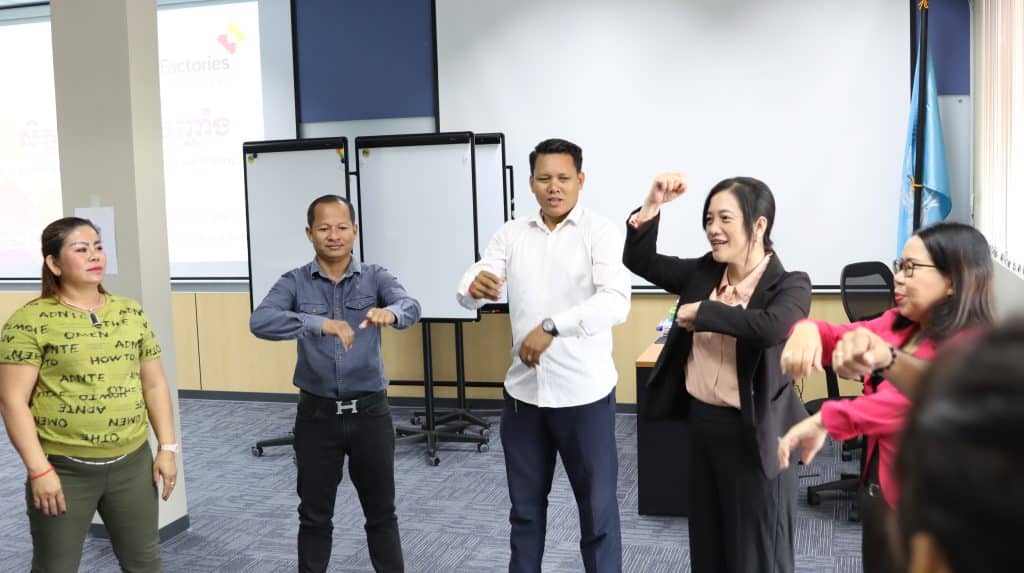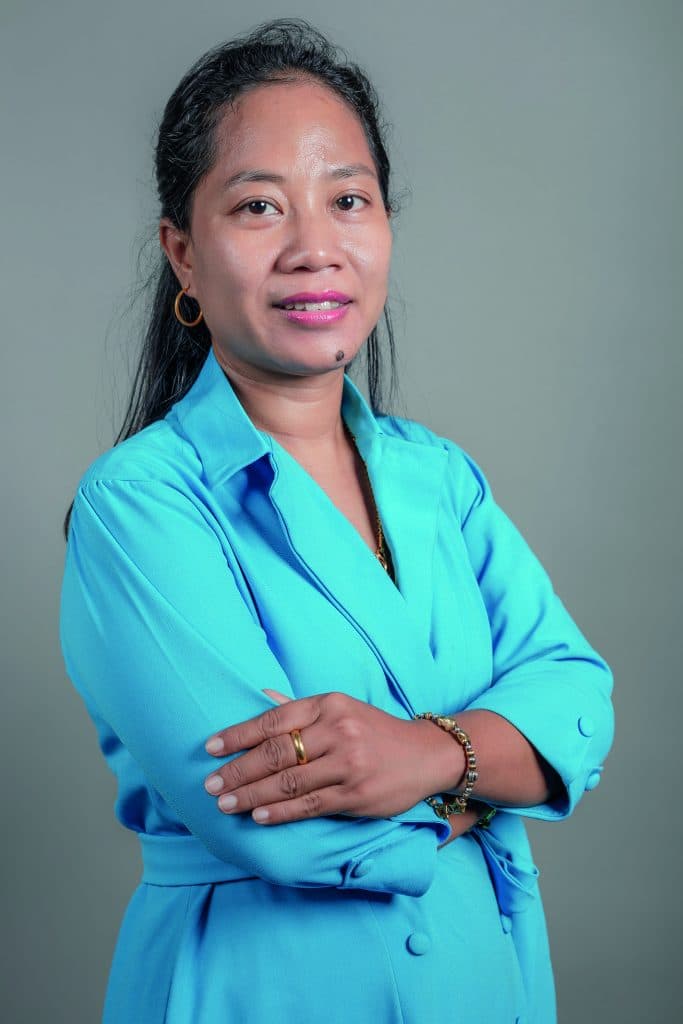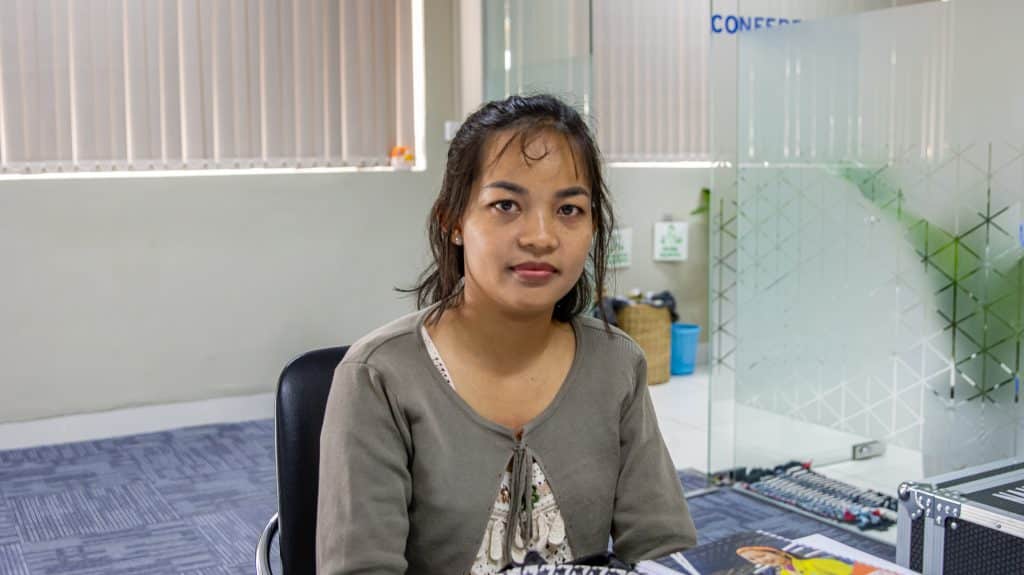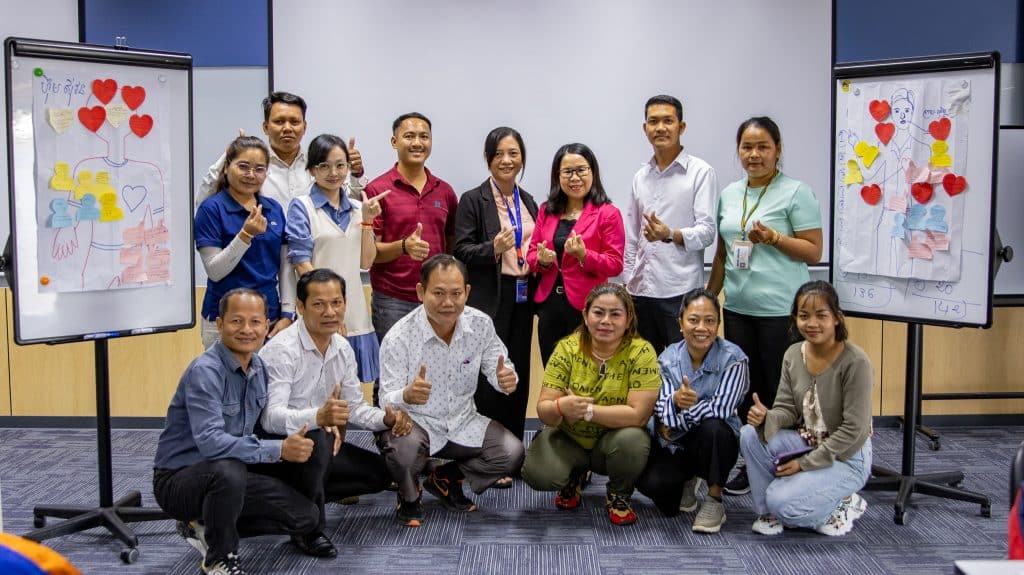PHNOM PENH – During the COVID-19 pandemic, leadership capacity development within garment factories took on a new urgency, and Better Factories Cambodia (BFC) developed the first session of the Factory Ambassador Programme (FAP). The programme is designed to support the capacity development of key members of the factory bipartite committee to take more ownership of improving their workplaces.
The goal is to elevate factory ambassadors, equipping them with the skills and confidence to transform their workplaces. Moving from passive recipients of training to proactive leaders, these ambassadors now diagnose emerging issues, facilitate problem-solving, and tailor training to their factories’ specific needs.
FAP is designed to complement the existing advisory services provided by BFC. The programme is structured as a 10-module course that covers essential areas such as soft skills, Occupational Safety and Health (OSH), Human Resources, and Industrial Relations. Throughout the year of BFC’s advisory engagement, ambassadors participate in guided self-diagnosis and bipartite committee meetings, improving the capacity to identify root causes of problems that exist in factories and recommend effective solutions.
During the initial stages, BFC sought out high-potential leaders—individuals who were naturally approachable, emotionally intelligent, skilled listeners, and had some degree of experience or interest in applying new ideas or technologies. Priority is also given to applicants who outline specific plans to apply the skills and knowledge to their organization.

Programme Impact
Sim Noreth, a BFC trainer and advisor, reflects:
“When factory ambassadors take ownership of problem-solving, root cause analysis, and finding solutions, big problems can be reduced to small problems or caught early. This proactive approach empowers teams to solve issues independently.”
Our first cohort faced the unique challenge of online training during the pandemic. This period was an opportunity to innovate and learn. Feedback led us to expand the next cohort to full-day, in-person sessions, significantly enhancing attendance and participant interaction.
Building on this success, BFC partnered with a buyer to tailor the program to the specific needs of their partner factories. Addressing real challenges in management systems, facilitation, problem-solving, and grievance handling. Together, the BFC’s team and ambassadors developed robust improvement plans, quarterly reflections with the partnering brand allowed BFC to adjust the course and track progress.

Insights from the Field
Ambassador Spotlight 1:
Sophea, Zentai Garment Factory
Sophea, a forceful speaker with a strong sense of purpose, has journeyed from a “normal factory employee” to translator, HR manager, and now a general manager after over two decades in the industry. Her dedication to learning and growth drives her participation in the Factory Ambassador Programme.
“When I was a translator, there were many problems in the factory, but only 30% were discussed, and not the 30% that workers cared about. There was no bridge between workers and managers. I want to be that bridge,” Sophea shares.
Reflecting on her experience, Sophea emphasizes the distinction between management and leadership. “Management is about managing with limitations, but leadership is about listening, fixing problems, changing mindsets, and helping workers find purpose in their jobs. Leadership can change the world.”
Looking forward, Sophea is committed to her role, saying, “It’s more work to be an ambassador, but I’m happy to do it. Even if trainees move on, they will carry their knowledge with them.”

Ambassador Spotlight 2:
Kimsour, Markalot Factory
Kimsour, initially a quiet and reserved participant, recalls, “I wasn’t confident and didn’t understand technical topics like OSH systems and labour laws. Joining the bipartite committee changed that.”
Driven by a desire to learn and help her factory, Kimsour found the negotiation training particularly valuable. “Workers often come to me with problems. Instead of deciding who’s at fault, I now dig deeper to understand the issues and find solutions.”
Active listening became a crucial skill for Kimsour. “I did not feel like I was an active listener before. Now, I understand where workers are coming from and can effectively communicate. I’ve learned how to investigate and turn problems into solutions.”
“Now I listen more actively. I’ve learned how to investigate, find the problem, and see how the problem can become a solution.” – Kimsour, Markalot

Looking Forward: More Sustainable Business Practices and Responsive Factories
Noreth noted that there has been remarkable progress from ambassadors on the self-conducted internal audits. “Their skills lead to better-run production, increased worker knowledge, and higher productivity, which ultimately results in lower turnover rates. Factories with ambassadors are notably more responsive to workers’ needs. Ambassadors independently facilitate bipartite meetings and deliver quality improvement plans promptly. Workers trust ambassadors more, and ambassadors strive to stay close to workplace issues.” said Noreth.
At the enterprise level, the Factory Ambassador Programme’s year-long format is uniquely beneficial for applied learning, given the rigorous curriculum. New cohorts are already in progress, which have integrated insights from the pilot year into our success indicators.
Beyond the enterprise, the program demonstrates that trained factory leaders can drive a culture of compliance and continuous improvement. As these leaders move to new factories, they carry their knowledge and skills with them, fostering a generation of factory leaders who take ownership, facilitate social dialogue, and improve their enterprises.